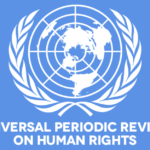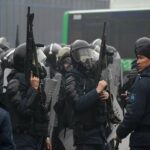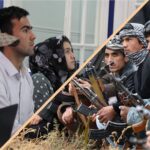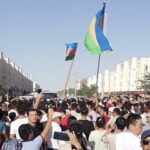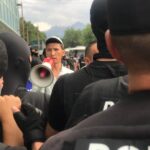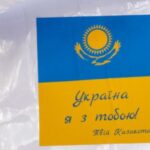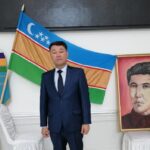13 November 2009
As a result of criminal proceedings that were not consistent with the principles of a fair, objective and impartial trial, after which we were sentenced, on an illegal basis, to four years of imprisonment each, on October 25, 2009 we were taken to a penal colony settlement for persons committing offenses due to negligence located in Ust-Kamenogorsk in order to serve our sentence.
According to the applicable penal legislation, a penal colony settlement is classified as a correctional facility with the most preferential confinement conditions. All those kept in penal colony settlements committed, for the most part, minor unintentional offenses and do not need any special correctional measures applied to them. Therefore, in accordance with penal law, convicts should be kept in penal colony settlements without security guards, under the surveillance of the administration, having the right to move freely around the colony settlement, to short-term (two to four hours) and long-term (up to five days) visits outside the facility without any limitations as to their number, and to living with their family outside the facility in their own or rented houses; in case of a regular job and positive references, they may enjoy fifteens business days of vacation each year with the right to go home, use money with no restrictions, purchase food and clothes, and go outside the colony without escort due to work, treatment, studies, etc.
Normally, the administration of such facilities provides assistance to convicts with employment at enterprises belonging to the penal system, or other enterprises, facilities, and organizations. According to the law, convicts can be involved in individual labour activities, and sign individual work contracts with employers who are ready to provide convicts with work based on their skills, occupation and proper reimbursement for their work. This is particularly important in light of the fact that the overwhelming majority of convicts in penal colony settlements for persons committing offenses due to negligence bear certain obligations on compensating the injured party for pecuniary and non-pecuniary damage, which amounts to hundreds of thousands, and sometimes millions tenge. Furthermore, many convicts have families with underage children who also need to be supported financially. Therefore, as a rule the administration of colony settlements, following the interests of the state, are keen on helping convicts to find high-paid jobs, and sign labour agreements with such employers independently and easily. In actuality, all these rights of convicts are, to one extent or another, followed in colony settlements in
First of all, the colony settlement for persons who committed an offense due to negligence in
Secondly, in the beginning of October over a hundred convicts were transferred urgently to this colony from the only colony settlement for persons committing offenses due to negligence in
The past two days have been marked by direct pressure on us on the part of penal system officers. Despite the constitutional prohibition of coerced labour except for cases when instructed by a court’s decision that came into force, the administration of the facility attempted to force us to sign labour contracts with the enterprise Enbek Oskemen for the position of safety officers with twenty thousand tenge as our monthly salary. In case of T. Kuchukov who has about one and a half million tenge worth of indemnity obligations and legal costs, as well as his mortgage loan to pay and two underage children to support, it will take at least six years if he keeps transferring all of his salary on a monthly basis without helping his family. At the same time, the administration of the colony did not allow to sign labour agreements with another employer who offered E. Zhovtis a position of a legal advisor and T. Kuchukov a position of a journalist, agreeing to pay several times as much as Enbek-Oskemen.
Our refusal to sign contracts based on unsuitable terms and conditions, as well as unsuitable remuneration, and our willingness to sign a contract with another employer offering us a job, was viewed by the administration as our disinclination to work and serious violation of the regime, and we were told we might face a penalty or even be transferred to a standard regime colony[1]. All demands of coerced labour are unconstitutional and inconsistent with
Yesterday, on 12 November 2009, the administration of the colony settlement refused to allow us to visit a dentist due to some problems with teeth, suggesting the injection of painkillers instead. We turned down the offer, asking for proper medical treatment, which was declined to us. The medical unit in the colony settlement falls short of every standard imaginable, while the nurse does not provide any medical assistance, except for emergency cases.
On the basis of what is taking place, we would like to make the following statement.
We have an impression that the administration of the colony settlement managed by the Penal System Committee Department in East Kazakhstan oblast and Penal System Committee under the Ministry of Justice of the Republic of Kazakhstan has set a goal, in apparent violation of the law, to restrict our movement outside the colony settlement, as well as contacts with our friends, family members, and the public, and to prevent us from medical treatment and employment of our own choosing.
We have some doubts as to the fact that this arbitrary decision by the management of the penal system was not coordinated with those who were behind the judicial proceedings and all events appertaining thereto.
We’ve never had any wish to politicize our criminal prosecution and guilty verdicts. However, what we’ve seen demonstrates a political overtone to and motivation of our cases. We don’t have any wish to politicize our confinement in the colony settlement, but everything that is happening around us in this correctional facility makes us assume that the actions of penal system officers are politically motivated.
We are hopeful that our statement will be further disseminated and will get an appropriate response from those who might be interested by it.
Journalist T. Kuchukov
Human rights activist E. Zhovtis
Penal facility OV-156/13



